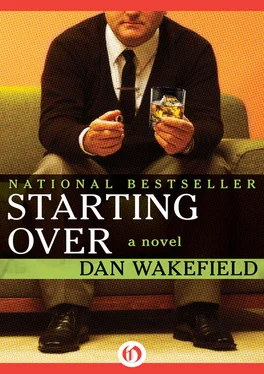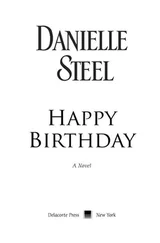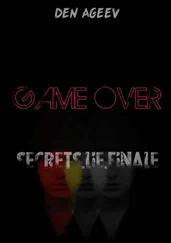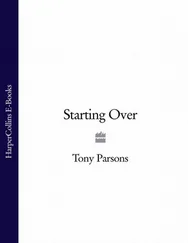“Fortunately for me,” Potter smiled.
“Indeed.”
The edges of Sample’s mouth twitched in a movement that indicated something between a smile and a sneer. His long face looked remarkably grey. Potter had the feeling that if Sample coughed, dust would come out.
The Gilpen faculty members at the party seemed a pretty motley crew, ranging from academic types like Sample to a longhaired young man whose background and expertise seemed even more “practical” than that of Potter. Buford explained that he was, by profession, a television repairman, as well as a Gilpen instructor.
“What do you teach?” Potter asked.
“Television repair.”
“Where?”
“At Gilpen. It’s a required course for all Communications majors.”
Potter smiled, not knowing if Buford was putting him on, but the young man seemed completely sincere.
“Dean Hardy feels,” he explained, “that if ‘The Medium is the Message,’ as McLuhan says, it’s important to know how our most significant medium of communications really works, from the inside out.”
“Ingenious,” Potter said.
Buford shrugged. “It follows.”
“I suppose it does.”
Potter went to get another drink.
An amiable man with red hair and a bright pink face introduced himself as Gafferty, a fellow instructor in Communications. Perhaps because of his open smile, or because he asked the Harvard bartender if he’d mind just fixing him a glass full up with whiskey and a little ice, Potter took an instinctive liking to the guy, and asked him if faculty members as well as students were required to be experts in Television Repair.
Gafferty laughed, his cheeks growing pinker. “Ah, would ya believe it now? The scholar of the future will carry a monkey wrench instead of a book.”
“I take it McLuhan is pretty big around here.”
“Rather a patron saint, I’d say.”
A tall, graceful young woman drifted by and Gafferty hailed her, throwing an arm around her bony shoulders in a friendly, fatherly way, presenting her to Potter. “Would you believe this beautiful girl is a Scientist? A doctor of chemistry, that most occult study.”
She gave Gafferty a peck on the cheek, and held a thin long hand toward Potter. “I’m Alison Farr,” she said.
Gafferty went to get her the drink she had been on the way for, and Potter gave her a rudimentary résumé of himself. As he spoke, he felt almost hypnotized by her eyes. He usually didn’t notice women’s eyes. It was not that Alison Farr’s eyes were large and brown that engrossed him, it was the expression in them—a hurt look, as if someone had cruelly and unexpectedly rapped a ruler hard across her knuckles. Otherwise she seemed terribly calm and self-possessed.
“I lived in New York a while myself,” she said. “When I was married.”
“Oh?”
“I’m not. Married anymore.”
“Oh. Me, too—either.”
It was a bond, like people who have just met discovering that they both were expelled from the same university, or both recently had their appendix removed.
Two drinks later, when the party around them had reached a decibel of clinking and clattering sound that had them squinting in order to hear each other, Potter suggested they go out to dinner. Alison said if he didn’t mind potluck she’d like to just go back to her place and eat, she wanted to relax.
Potluck turned out to be a wonderful coq au vin that Alison said was no trouble at all. She explained that she loved any excuse to cook well, it was kind of a hobby with her, took her mind off things, but she found it hard to do by herself.
Potter nodded. “It’s like touch football,” he said.
“Football?”
“I mean, it turns your mind off. But you can’t do it alone.”
“Oh. Yes.”
Alison put on a record of Leontyne Price singing famous arias. It was lovely, but almost painfully intense. Like Alison. Potter found he was afraid of that right now. The intensity. He liked Alison Farr and he would like to go to bed with her, but he knew it would not be casual and amiable and safe. He did not want to have to look into those huge hurt eyes of hers afterward, did not want to be involved in their depths.
It was the time when he would make his move with her now or not, and she knew that, and evidently knew his thoughts and doubts, and said, “I guess I’m very serious, right now. About things. And people.”
“I know. And I guess I’m not. Not now, anyway. Or can’t be yet, or something.”
“Good night,” she said.
Potter stood up. “Thank you,” he said. “For the dinner. And everything.”
She nodded, her eyes closed.
“Good night,” Potter said.
Potter had no special assignment for registration day at Gilpen, but he thought he ought to show up. He scotch-taped a schedule of classes and office hours to his door, and then went down to the first floor where students were signing up for classes. It was crowded and a little confusing, and Potter just milled around aimlessly for a while, till he ran into Gafferty and asked if he’d like to go out for a beer.
“Splendid suggestion,” Gafferty said.
They walked down Beacon and across the Commons over to Jake Wirth’s, which Gafferty swore would be worth the walk. It was an old German place, one of the oldest restaurants in Boston, Gafferty said, and one of the few of any age where a man could still get an honest sandwich and a good draft beer. The place was large and plain, with bare wood tables, and Potter liked it. They each had a stein of dark.
“You seemed to be hittin’ it off nice with lovely Alison,” Gafferty said. “At the party.”
“Oh—sure. I mean, she’s a very nice person.”
“Lovely girl. Been through a rough time, with divorce and all.”
“I know.”
“I was sort of hopin’, you and she—”
“I don’t think so. I think we’re both too much in the same—uh—sort of condition. It’s hard to explain. I just got divorced myself recently.”
“Oh, I’m sorry. It must be a hard thing on a person.”
“Yes. No matter how you cut it. You can’t make it light and easy. I take it you’re married?”
“Married? Ah, that hardly covers it, man. Been married ten years, and I’ve got myself nine children. And the wife, of course.”
“ Nine? ”
“I can field my own baseball team.”
“Jesus. Nine.”
Potter felt a sense of awe at the enormity of it, and in one way an overwhelming relief that he had no such burden himself. But in another way it made him feel empty, one-dimensional, a dropout from the population explosion, an outsider from the great Dickensian family tradition. He had a fleeting sense of being in a contest with a man who was about his own age and in general his own profession, and the score was a lopsided 9–0 against him.
“In a way,” he said, “I envy you—that big family.”
“Ah, but don’t we all envy the next man? Me of course envying your carefree life, with lots of girls and no house deeds and diapers.”
“Sure,” Potter grinned. “And I hope you know, of course, I’m sure, that my life is about as glamorous as yours. Falls as much short of the image, anyway.”
The two men felt at ease with one another, and they drank and talked themselves into a state of camaraderie and boozy philosophizing that led Potter to ask his new friend what he “wanted out of life.”
“Ah, I’ve been asked that a number of times. All I can answer is—and I really mean it—I’d just like to feel up to snuff.”
They both broke out laughing, and Potter said, “If you can do that—feel up to snuff all the time, or most of the time, you’ve really accomplished something.”
“Surely I believe that,” Gafferty said. “It’s more than I’ve ever got for very long. But Jesus, man—I don’t mean to complain. I love to teach, when I teach what I love, and I manage to do that most of the time. In spite of the requirements. I mainly teach the Irish poets. If that doesn’t count as the grandest ‘communications’ man has come up with, I’ll eat my hat. I teach that McLuhan fellow for a week or so, and then I get to the real Communications—Yeats, Joyce, Synge, O’Casey …”
Читать дальше












